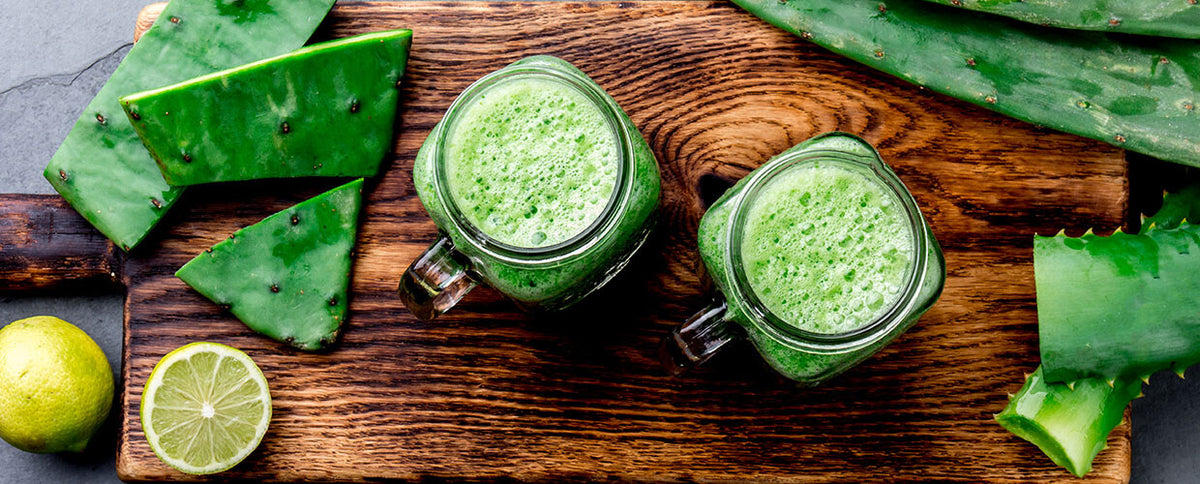5 Reasons to Drink Aloe Vera Juice

You may have heard of aloe vera to treat sunburn, but have you heard of aloe vera juice? Like chlorophyll water and kombucha, aloe vera juice—with its super hydrating and gut-boosting abilities—is one of the latest health drinks people are swearing by as they look for more natural and alternative approaches to overall health.
Aloe vera is an evergreen perennial plant grown in tropical environments, but it’s also used as a decorative and functional house plant. Long known for its topical applications of wound healing, aloe vera is now being used as a potentially beneficial beverage.
What Is Aloe Vera Juice?
Aloe vera juice is produced through a process that involves crushing, grinding, or pressing the entire leaf of the aloe vera plant to produce a liquid. This liquid is then sent through various steps of filtration and stabilization. The finished product can be added to water or your other favorite beverage undetected. (But be careful when buying aloe vera juice in the store—it can be added to other drinks that are high in natural and added sugar.)
Research indicating conclusive benefits of drinking aloe vera juice are limited. Studies verifying the efficacy of benefits are limited and underwhelming, so those looking to incorporate aloe vera juice should do so as part of an overall nutrition approach that naturally promotes hydration and intake of a mostly plant-based diet complemented by routine physical activity.
Here are five potential benefits of picking up this plant elixir:
1. It’s Super Hydrating
Aloe vera juice offers phytonutrients (AKA plant nutrients) that may help detoxify the body naturally while assisting organ function. Phytonutrients, unlike micronutrients (vitamins and minerals), aren’t essential to our health but have shown benefits by working synergistically to promote health. Antioxidants found in aloe vera extract help to reduce free radicals that occur as part of the body’s oxidation process. The maturity of the plant and the quality of the juice will be a determining factor in the phytonutrient density.
2. It Offers Vitamins and Nutrients
Aloe vera juice’s vitamin and mineral profile includes calcium, copper, magnesium, potassium, manganese, zinc, and B12, just to name a few, plus phytonutrients and antioxidants for better overall health. As part of an overall healthy diet, aloe vera juice can contribute to your daily intake of micronutrients. Although not as nutrient dense as eating actual plants, adding a splash of aloe vera juice to your daily water bottle adds an extra source of nutrition.
3. It’s Alkaline
Aloe vera juice is naturally alkaline, helping to balance your body’s healthy alkalinity. A normal blood pH level is 7.40 on a scale of 0 to 14, where 0 is the most acidic and 14 is the most basic. The body has its own methods for maintaining this balance as long as you’re consuming a healthy diet. Here’s what’s on both ends of the spectrum:
- Acidic foods: Meat, poultry, fish, dairy, eggs, and grains
- Alkaline foods: Fruits, nuts, legumes, and vegetables
- Neutral foods: Natural fats, starches, and sugars
Unless prescribed by your doctor, there is no need to go out on a limb trying to eat a particularly alkaline or acidic diet. Your ultimate goal, as with any nutrition approach, is to take in a variety from both sides of the scale and maintain a majority from the middle range. As always, keep things simple.
4. It’s Good for Your Gut
As a hydration source, aloe vera juice helps increase the water content of your intestines, assisting in gut transit time and promoting regular bowel movements. The juice also naturally contains the digestive enzymes aliiase, alkaline phosphatase, amylase, carboxypeptidase, catalase, cellulase, lipase, and peroxidase. These enzymes work in combination inside your digestive system to help the breakdown of sugars and fats.
5. It’s Anti-Inflammatory
Inflammation is a natural process that occurs in the body. The acute inflammation that occurs post-exercise is the body’s way of healing. It’s the chronic inflammation that can cause eventual damage to our tissue and muscles.
Studies have shown aloe vera juice to play a role in making vitamin E more bioavailable to the body. Vitamin E is an antioxidant that helps fight free radicals that can occur in the body as a result of stress (such as exercise). Free radicals, left unassisted, can contribute to cell damage.




